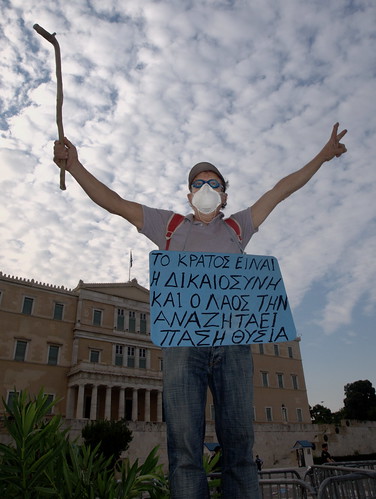
Last week the leading commentator at one of Greece's largest private TV stations raised the possibility of a political alliance between the ruling conservative New Democracy party and the Neonazis in Golden Dawn.
"Why shouldn't New Democracy co-operate with a serious Golden Dawn?" asked B
abis Papadimitriou, the head of the staunchly pro-government Skai TV. The statement was prompted by the latest opinion polls that show the
continued rise of Golden Dawn, now at 13-15% and the poor showing of the other partner in the Greek ruling coalition, PASOK, whose fall from electoral Grace has seen support plummet from 42% to 7- 8% within the space of four years.
Papadimitriou's remarks immediately provoked a storm of angry response from Greek Twittersphere and political commentators, many of whom believe that this is the first step in the process of "rehabilitating" Golden Dawn. Such was the reaction that Skai dedicated an entire hour the following day to giving Papadimitriou a chance to clarify his stance. His argument was that Golden Dawn, Greece's third most popular party now represent a large proportion of the electorate and that a similar
alliance between centre right and far right parties had already taken place in Norway.
At first glance such an alliance would contradict prime minister, Antonis Samaras's policy of presenting himself and his party as a bulwark against the threat of rising extremism.
The Policy of The Two Extremes as it has been termed involves the government and its supporters in the pro-government mass media painting both its opponents on the Left and Right as a dangerous challenge to political stability, harking back to the often chaotic politics that Greece lived through during the 20th century. With junior partner, the nominally left-wing PASOK party hemorrhaging votes, it's leader Evangelos venizelos has been more than willing to go along with this strategy in the hope of scaring back voters from SYRIZA.
The violence used and glorified by Golden Dawn is therefore equated with supposedly similar trends in SYRIZA and the Greek Communist Party (KKE). In such an equation, brutal attacks on immigrants, Nazi salutes and 1930's style Brown Shirt street fighting is considered the same as strike action or sit down protests. In such a world, New Democracy and PASOK can present themselves as a sane alternative to such political madness, a stabilising influence in difficult times.
The problem with this theory is that just does not reflect reality on the ground, no matter how much political and media spin is used. The rise in political influence and extremism on right has not be mirrored by 1930's style street tactics on the left. It is Golden Dawn MP's who have been charged (though not sent to convicted of)
with a raft of offences ranging from assault to possession of illegal weapons. It is their supporters who have repeatedly been accused of e
ndless list of attacks against immigrants and increasingly domestic political opponents.
As if to underline this just a day after Babis Papadimitriou talked of the possibility of bringing
Golden Dawn in to government, 50 of their supporters took part in a bloody attack on Greek communists who has putting up posters in the city of Perama which left nine of them in hospital.
On other hand the differences between Golden Dawn and New Democracy are fewer than they'd either would like to admit publically. The lurch to the right that PM, Antonis Samaras brought to his party has seen the rise to power of far right supporters, many refugees from the ultra-nationalist LAOS party which was all but wiped out in the last elections. In terms of immigration, for example, New Democracy's policies are little more than a more polished version of unvarnished racism of Golden Dawn.
Despite the political risks that both parties face forming an alliance, New Democracy, at least may not have any other choice. The party cannot rule on its own, having seen its share of the vote drop from 40+ % to 26-29% and it's current coalition partner PASOK is fading away, suffering a wane in political fortunes on par with that which struck the UK Liberal party in the 1920's.
Although die-hard supporters still maintain that PASOK leader, Evangelos Venizelos has a master plan to turn the situation around, the reality is that its decline is irrevocable and that any recovery that may take place is years in the future and almost certainly without the presence of Venizelos who has become personally identified with the decline in Greece's fortunes.
The fact that a recent poll found that in one of Greece's largest electoral districts in Athens support for PASOK among younger voters was 0% just underlines the the scale of the problem.
Some commentators have argued that the government's demonisation of Golden Dawn rules out a coalition however, in true Orwellian fashion New Democracy has changed policy stances on a number of occasions. Samaras positioned himself when in opposition as Greece's best hope to fight austerity and then once elected to promote himself as its most loyal defender. Yet one more u-turn in a long history of such moves would surprise few observers and given Samaras's own history as a semi-reconstructed ultra-nationalist an alliance with Golden Dawn would far more sense than one with his arch political rival, PASOK and its leadership.
What is in this for Golden Dawn is less clear since its entire existence is predicated upon its staunch opposition to the political establishment which it has painted as a hotbed of corruption and worse. They have made much of their anger with austerity, promoting themselves as agents of national resistance against a anti-Greek, internationally orientated elite who are betraying the homeland in order to hang onto power. To suddenly join up with New Democracy would risk them being consigned to the dustbin of history, suffering the same fate as far right LAOS party who made the same transition and paid the price for it at the polls.
On the other hand the siren call of access to the State and all the power and privileges that go with it has turned many a head in Greece's turbulent political past. With government position comes the ability to reward followers with public contracts and civil service jobs, a potent recruiting tool in difficult times. More importantly, a role in government brings legitimacy especially in the eyes of
Greece's oligarch owned mainstream media who would quickly forget any qualms they once harboured about hosting violent Nazi style idealogues.
None of this is likely to happen soon unless the tensions that underlay the government coalition become untenable and since neither side is looking to go to the polls before it is absolutely necessary that seems unlikely. However, the fact that pro-New Democracy media is mooting the idea of a future alliance between Golden Dawn and New Democracy means that the prospect is being discussed and the waters tested.
Faced with the possibility of a future government lead by SYRIZA Greece's economic and political establishment would be more than willing to hold its nose and embrace a Neonazi party rather than see Greece clash with creditors over the terms of the bailout deal and the attendant risk of exit from the Eurozone.
.
*Note. This post was written just days before a man identified as a Golden Dawn member was accused of stabbing to death singer and left-wing activist Pavlos Fyssas.


